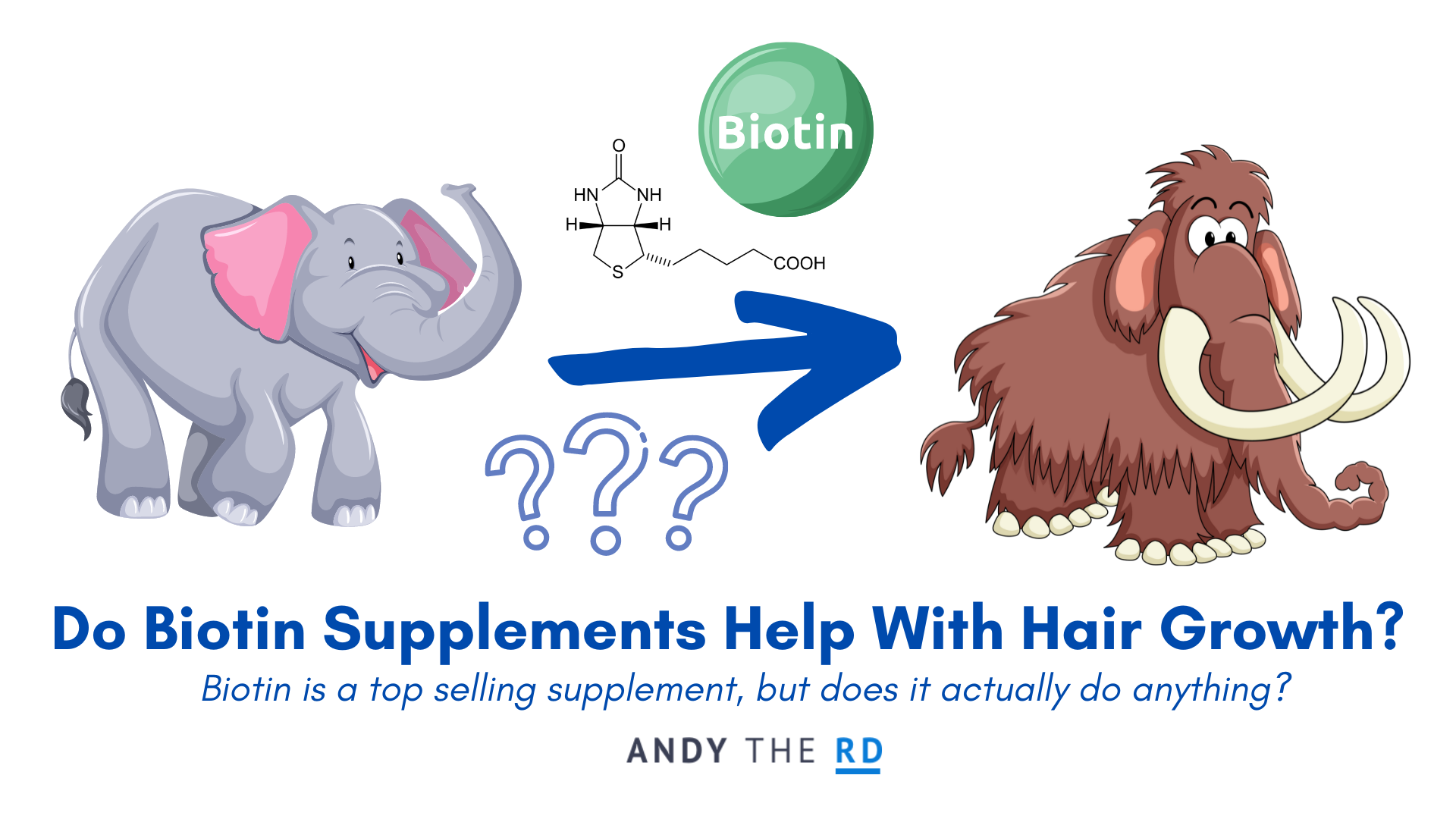One of the things that I pride myself on as a nutrition blogger is keeping a drift of the latest trends when it comes to popular nutrition topics.
With this in mind, I’ve noticed a trend that many of my female clients are coming in and reporting the use of a biotin supplement, citing hair health as the primary motivation.
What’s more is most additionally report that they believe they really notice an improvement when it comes to perceived hair quality after prolonged use of the supplement.
This really had me interested!
Biotin is not considered a nutrient of concern from a public health perspective.
It’s widely available in commonly consumed foods, products and supplements in North America.
A Hairy Issue
Obviously hair quality is an important topic for many people.
We all want thicker, lusher manes now don’t we?
And so if there was evidence of a safe, affordable and readily accessible supplement that could help with that, why wouldn’t I want to learn more?
That’s exactly what I did
Getting To The Root Of Things
The first thing I did was take a look at the Health Canada Natural Health Product Monograph database.
There was no mention on that page of evidence of an effect on hair quality.
The primary noted utility of a biotin supplement was, in fact, to treat biotin deficiency.
Hair thinning or loss can be explained by a number of reasons, including a potential deficiency.
Which, for the record, was also noted as being very rare.
So the next thing I did was google “Harvard biotin hair” to see if the Harvard Med School Website had anything to say on the topic.
Sure enough, they did:
“There aren’t a lot of firm, medically sound studies to support taking these supplements, but they’re harmless,” Dr. Scott says. If you want to try taking biotin, it probably won’t hurt. For hair loss, biotin is sold in doses of 2 to 10 mg. Because certain nutrient deficiencies, particularly iron, can worsen hair loss, it’s worth getting checked out by your doctor. Diagnosed deficiencies can be easily treated.
My understanding of public health data out of Canada suggests to me that an iron deficiency is probably a more common concern than biotin deficiency in the average person, so that’s certainly something to keep in mind for those of you reading with hair concerns.
Now that particular Harvard page was published in 2014, so I figured I’d take a look to see if any scientific studies have been published since then to challenge or elaborate on the evidence associated with biotin supplementation.
Data Or Dandruff?
a 2017 review out of the Skin Appendage Disorders journal concluded that:
Despite its popularity in the media and among consumers, biotin has no proven efficacy in hair and nail growth of healthy individuals.
The paper also confirmed the notion that biotin deficiency is extremely rare in the general population.
Another 2017 paper out of the Journal Of Drugs In Dermatology came to similar conclusions.
The paper maintains that although biotin is an enzymatic cofactor for mitochdonria in the roots of hair, the only strong evidence of utility for biotin supplementation remains biotin deficiency.
Which, as I said, continues to be reported as a very rare condition.
Even so, the study notes that certain contexts such as malabsorptive GI disorders, excessive intake of raw egg whites and the prolonged use of anti-seizure medication, in addition to certain rare genetic conditions, could lead to biotin deficiency.
I also noted a 2014 study suggesting that biotin metabolism changes during pregnancy and lactation.
So there are certainly some contexts where biotin-related issues may be more likely, even if they remain rare.
It is, if nothing else, a little something to think about.
Summing Up The Evidence
a 2014 MD authored paper out of the Journal Of Trichology had this to say:
The custom of treating women complaining of hair loss in an indiscriminate manner with oral biotin supplementation is to be rejected, unless biotin deficiency and its significance for the complaint of hair loss in an individual has been demonstrated on the basis of a careful patient history, clinical examination, determination of serum biotin levels, and exclusion of alternative factors responsible for hair loss.
This statement seems to aptly summarize the general scientific consensus and the information that I’ve provided thus far.
But I believe it helps me, so can I take it anyway?
Biotin is not considered to be harmful at reasonable levels of intake, but the FDA has recently warned that excessive supplementation ( likely from multiple sources) could interfere with important lab test results, including those for thyroid hormone.
If you take one or more supplements containing biotin, and have important lab work pending, it may be worthwhile to have a read of this FDA article and speak to your healthcare professional.
Final Thoughts
Without being overly dramatic or discounting anyone who has had a positive experience with biotin, I’ve tried to be informative, reasonable and objective in assessing the current state of the evidence and whether or not biotin supplementation is a legitimate means to affect the health of your hair.
Hope it helped!
Andy De Santis RD MPH



